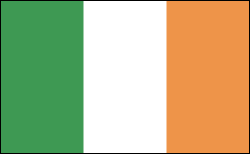- / Countries of the World
- / history
Ireland History

Index
Partition of Ireland Sets Off Civil War
Anti-British agitation, along with demands for Irish home rule, led to the Easter Rebellion in Dublin (April 24–29, 1916), in which Irish nationalists unsuccessfully attempted to throw off British rule. Guerrilla warfare against British forces followed proclamation of a republic by the rebels in 1919. The Irish Free State was established as a dominion on Dec. 6, 1922, with six northern counties remaining as part of the United Kingdom. A civil war ensued between those supporting the Anglo-Irish Treaty that established the Irish Free State and those repudiating it because it led to the partitioning of the island. The Irish Republican Army (IRA), led by Eamon de Valera, fought against the partition, but lost. De Valera joined the government in 1927 and became prime minister in 1932. In 1937, a new constitution changed the nation's name to Éire. Ireland remained neutral in World War II.
In 1948, De Valera was defeated by John A. Costello, who demanded final independence from Britain. The Republic of Ireland was proclaimed on April 18, 1949, and withdrew from the Commonwealth. From the 1960s onward two antagonistic currents dominated Irish politics. One sought to bind the wounds of the rebellion and civil war. The other was the effort of the outlawed Irish Republican Army and more moderate groups to bring Northern Ireland into the republic. The “troubles”—the violence and terrorist acts between Republicans and Unionists in both the Republic of Ireland and Northern Ireland—would plague the island for the remainder of the century and beyond.
